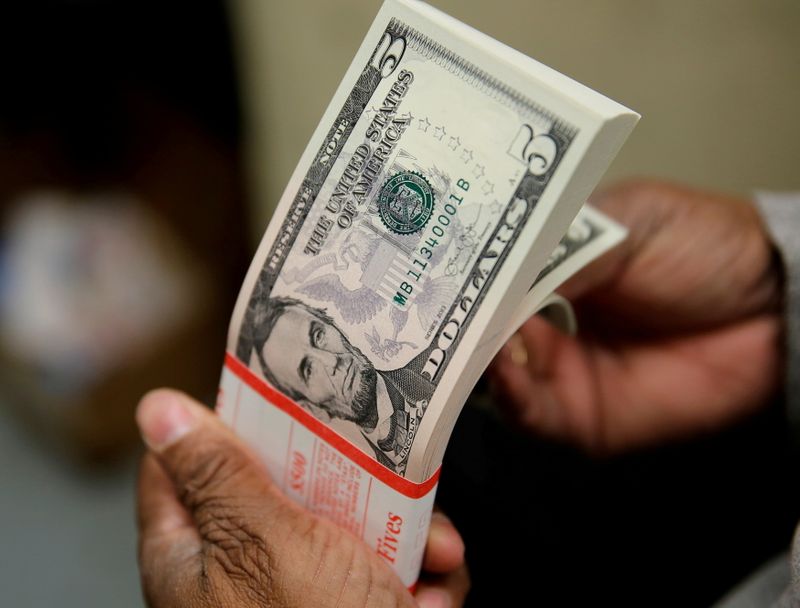By Mike Dolan
LONDON (Reuters) - Wasn't surging inflation supposed to undermine the U.S. dollar?
Be that as it may, the opposite happened this week as news of a surprise spike in U.S. inflation and inflation expectations to their highest in decades sent the U.S. dollar soaring against currencies around the world.
The dollar's main index zoomed to its highest for the year as the euro and sterling, which make up 58% and 12% of that index respectively, slumped to 2021 lows.
For some, this made little sense.
There's a long-standing narrative out there that over-easy Fed money and seemingly endless creation of new dollars via Fed bond buying will eventually fuel inflation and undermine the greenback as the kingpin of the world financial system.
All things equal, higher consumer inflation should be bad for a currency as it means people can buy fewer goods and services for their coin. Allowed to fester, spiralling prices and resulting hyperinflation have in the past rendered national currencies effectively worthless.
Fear of so-called 'dollar debasement' has been the stuff of gold bulls for decades, and many have been demanding a return to the gold standard ever since it was abandoned 50 years ago. Lately, cryptocurrency evangelists have taken up the cudgel.
Yet, the failure of bitcoin or ethereum to get excited by Wednesday's U.S. inflation shock underscored just how patchy the argument for buying crypto as an inflation hedge remains.
And even though gold rose this week, it remains in the red for the year. Long-standing gold bugs and Fed critics, such as Euro Pacific Capital's Peter Schiff, were left scratching their heads as to why the dollar was rising.
"Today's dollar rally makes no sense," Schiff tweeted on Wednesday. "The fact that the dollar is losing purchasing power much faster than expected doesn't make the dollar more valuable."
So what gives?
Prosaicly, it's all just relative. Even if faith in the Fed is in question, foreign exchanges dictate that any loss of the bank's credibility only matters if it's more or less than any other central bank out there.
And more posaically still, that all comes down to the basics of where you expect U.S. interest rates and inflation to be relative to those of their major peers a year from now.
DOLLAR IN YOUR POCKET?
This week's slide in the world's pivotal euro/dollar pair to its lowest since July 2020 came as the one-year interest rate gap in favour of dollars surged after the inflation data. It's now added almost 20 basis points to 0.9% in just three weeks.
The Fed is now priced to hike policy rates at least twice by the end of next year, starting as soon as July. The European Central Bank barely has one smaller hike priced, but ECB officials loudly insist a rate rise next year is very unlikely.
Whether these rate premiums cover expected inflation differentials is less obvious. They are shy on a one-year horizon - but they do seem to comfortably cover the risk on a 5-10 year view, judging by the relative inflation swaps market.
And more immediately, U.S. economic data is surprising consensus forecasts more positively than the still deeply negative surprises seen in the euro zone. In fact, the gap between U.S. and euro economic surprise indices compiled by Citi is more positive in favour of the United States than at any other point since October last year.
Even though Fed critics like Schiff doubt the Fed will be willing to tighten to the extent the market now thinks, more mainstream investors feel the Fed will react next year and there is much more room to reprice those expectations higher than there is for other central banks.
Leander Galli, senior portfolio manager at Amundi’s global fixed income team, thinks the market is neither fully priced yet for higher U.S. inflation longer-term nor for the degree to which the Fed will act to contain it.
"The more the Fed waits, the faster it will have to go eventually."
So is spiky inflation today the beginning of a big 'debasement' or the spur for more handsome returns?
There are myriad arguments back and forth as always.
What it does recall is the sometimes tedious debate over the U.S. Treasury's presumed 'strong dollar' policy - a clipped mantra that 'a strong dollar is in the U.S. interests,' which former Treasury Secretary Robert Rubin repeated in the 1990s to bat away questions about whether Washington weakened the dollar for trade advantage.
Subsequent Treasury secretaries often tied themselves in knots over the wording - often unwisely nuancing the statement around whether it simply meant a strong dollar in your pocket via low inflation or strength on world currency markets.
This week at least, it's most certainly the latter.
(by Mike Dolan, Twitter (NYSE:TWTR): @reutersMikeD; Editing by David Clarke and Steve Orlofsky)
